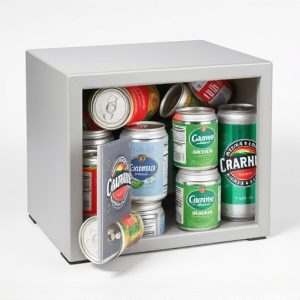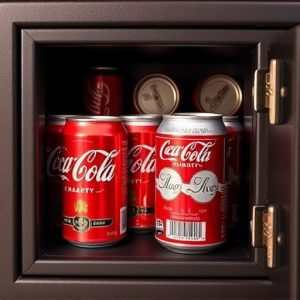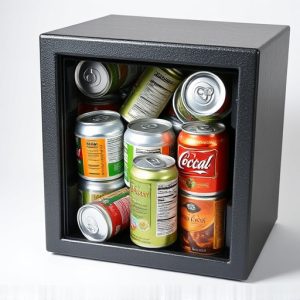Unveiling Covert Storage: Risks of Fake Cleaning Products in Outlets
Fake outdoor electrical boxes, designed to blend into homes, offer criminals covert storage for ille…….
Fake outdoor electrical boxes, designed to blend into homes, offer criminals covert storage for illegal activities while posing significant risks in terms of counterfeit household cleaning products. These imitations can contain toxic chemicals, substandard production quality, and improper disposal instructions. To combat this, scrutinize packaging details and container integrity, implement robust security measures like locked lids, regular inventory audits, surveillance systems, and child-safety locks to protect genuine products from covert storage in these boxes.
“Uncover the hidden dangers of covert storage, particularly in the context of fake household cleaning products. This comprehensive guide explores innovative ways fraudsters hide their counterfeit goods, with a focus on the unexpected ‘Fake Outdoor Electrical Box Storage’ method. We delve into understanding this tactic, its risks, and how to identify signs of fakes. Learn essential preventive measures to secure your space and protect against potential dangers associated with these hidden hoards of counterfeit cleaning products.”
- Understanding Covert Storage: Unveiling the Concept
- Fake Outdoor Electrical Box: A Potential Hideout for Fraudsters
- Risks and Dangers of Storing Fake Cleaning Products
- Identifying Signs of Fake Household Cleaning Items
- Preventive Measures: Securing Your Space and Products
Understanding Covert Storage: Unveiling the Concept
In the realm of security and stealth, “covert storage” refers to the art of concealing valuable items or sensitive materials in plain sight yet unreachable places. One such example that has gained popularity is the use of fake outdoor electrical box storage. These cleverly designed faux electrical boxes serve as the perfect hiding spots for important documents, precious metals, or even emergency supplies. By seamlessly integrating into a home’s exterior aesthetic, they offer an innovative solution for secure off-site storage.
The concept behind covert storage is to create a false sense of security in potential intruders. In the case of fake outdoor electrical boxes, carefully crafted replicas are installed on walls or in gardens, mimicking genuine electrical outlets or panels. This deceptive strategy not only discourages unwanted visitors from examining the area but also provides homeowners with a unique and discreet way to safeguard their assets.
Fake Outdoor Electrical Box: A Potential Hideout for Fraudsters
In today’s digital era, where technology offers both convenience and challenges, a seemingly innocuous item like a fake outdoor electrical box could serve as a cunning hideout for fraudsters looking to stash their covert storage. These imitation boxes, designed to mimic genuine outdoor electrical components, provide an excellent cover for hiding illegal substances, stolen goods, or even counterfeit cleaning products. Fraudsters can easily install these fakes alongside legitimate utilities, making them nearly indistinguishable from authentic fixtures.
The appeal of using a fake outdoor electrical box lies in its accessibility and relative anonymity. It allows criminals to store their illicit items within what appears to be a harmless, commonly accepted fixture. This tactic not only helps them avoid detection but also provides a means to distribute or sell their counterfeit cleaning products without raising suspicion. As such, it’s crucial for consumers and law enforcement alike to be vigilant in identifying these potential traps, ensuring the safety of our communities and maintaining the integrity of the market.
Risks and Dangers of Storing Fake Cleaning Products
Storing fake household cleaning products, often disguised in inconspicuous packaging or hidden in covert locations like a fake outdoor electrical box, presents significant risks and dangers. While these counterfeits might appear indistinguishable from genuine products on the surface, they can pose severe health hazards to you and your family. Many counterfeit cleaners contain toxic chemicals, heavy metals, or other harmful substances not listed on the label, which can lead to accidental poisoning if ingested or inhaled. Moreover, substandard production methods may result in inconsistent quality control, increasing the likelihood of product failure during use, potentially causing property damage or personal injury.
In addition to health risks, storing fake cleaning products hampers environmental conservation efforts. Counterfeits often lack proper labeling indicating safe disposal methods, leading to incorrect waste management practices. This can contaminate water sources and harm local ecosystems. Furthermore, the prevalence of fake products undermines consumer confidence in brands that adhere to safety standards, potentially encouraging a culture of using less regulated, untested alternatives.
Identifying Signs of Fake Household Cleaning Items
When it comes to identifying fake household cleaning products, one of the first places to look is the packaging. Authentic items typically have clear labels with precise ingredient lists and manufacturing information. Be wary of any packaging that seems hastily done or lacks essential details. A telltale sign of a counterfeit product is an unusual or misspelled brand name; legitimate manufacturers invest heavily in branding, so inconsistencies here are a red flag.
Additionally, check the storage container itself. Fake Outdoor Electrical Box Storage, for instance, should be secure and durable. If the packaging feels flimsy or the box shows signs of tampering, it could indicate a knock-off. Look for subtle differences in the material or construction compared to genuine products. Reputable brands also ensure consistent quality control, so if you notice a pattern of inconsistent product performance across multiple bottles, this may suggest counterfeits.
Preventive Measures: Securing Your Space and Products
To prevent the misuse of covert storage, especially in fake outdoor electrical boxes, securing your space and cleaning products is paramount. Start by ensuring all external electrical boxes are locked with secure lids or covers that require a key or specific tool to open. Regularly audit your inventory to account for all cleaning supplies, noting any discrepancies immediately. Implement access control measures, such as limited key distribution and surveillance systems, to monitor who enters storage areas.
Additionally, consider using child-safety locks or safety nets over potential storage spots to deter unauthorized access. Educate family members, roommates, or employees about the importance of respecting cleaning product storage locations. Regularly review and update security protocols to adapt to evolving threats, ensuring your household cleaning products remain safe and secure from covert storage attempts.
In light of the above discussions, it’s clear that storing fake household cleaning products in covert locations like a fake outdoor electrical box poses significant risks. Understanding these dangers is the first step towards safeguarding our communities. By identifying signs of counterfeit items and taking preventive measures to secure our spaces, we can protect ourselves from potential harm. Remember that awareness and proactive steps are key to mitigating these threats.


